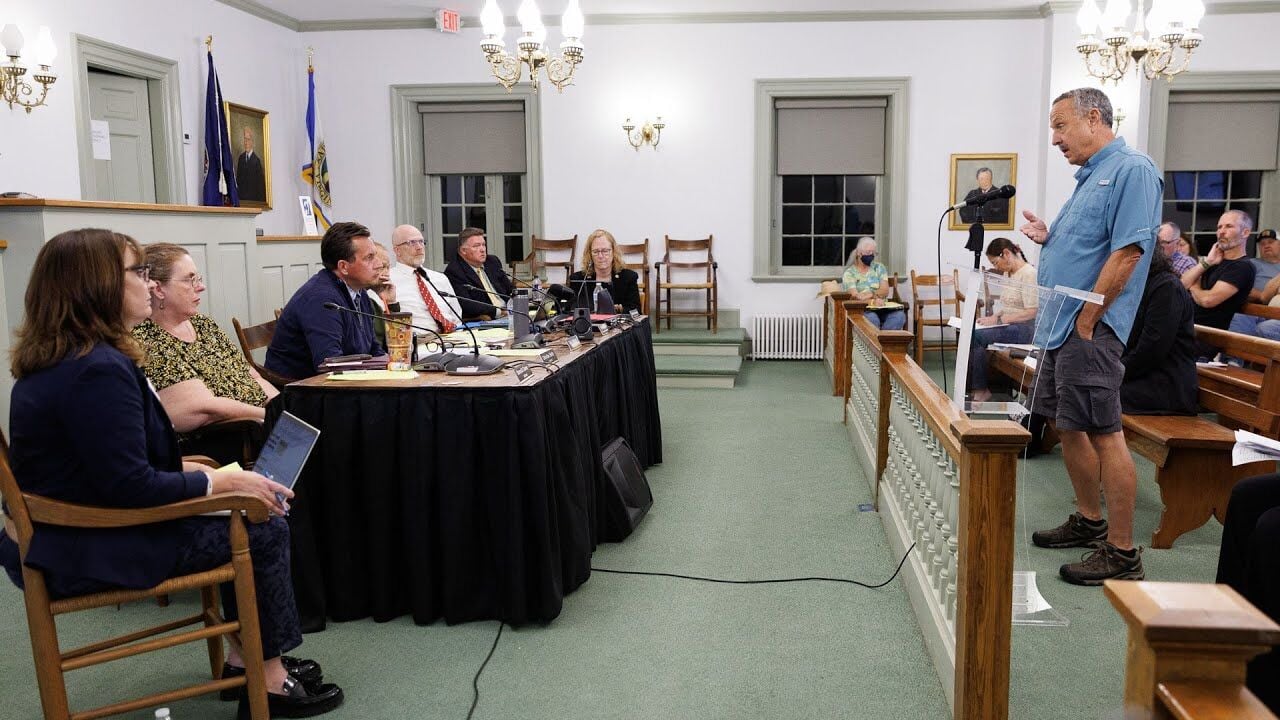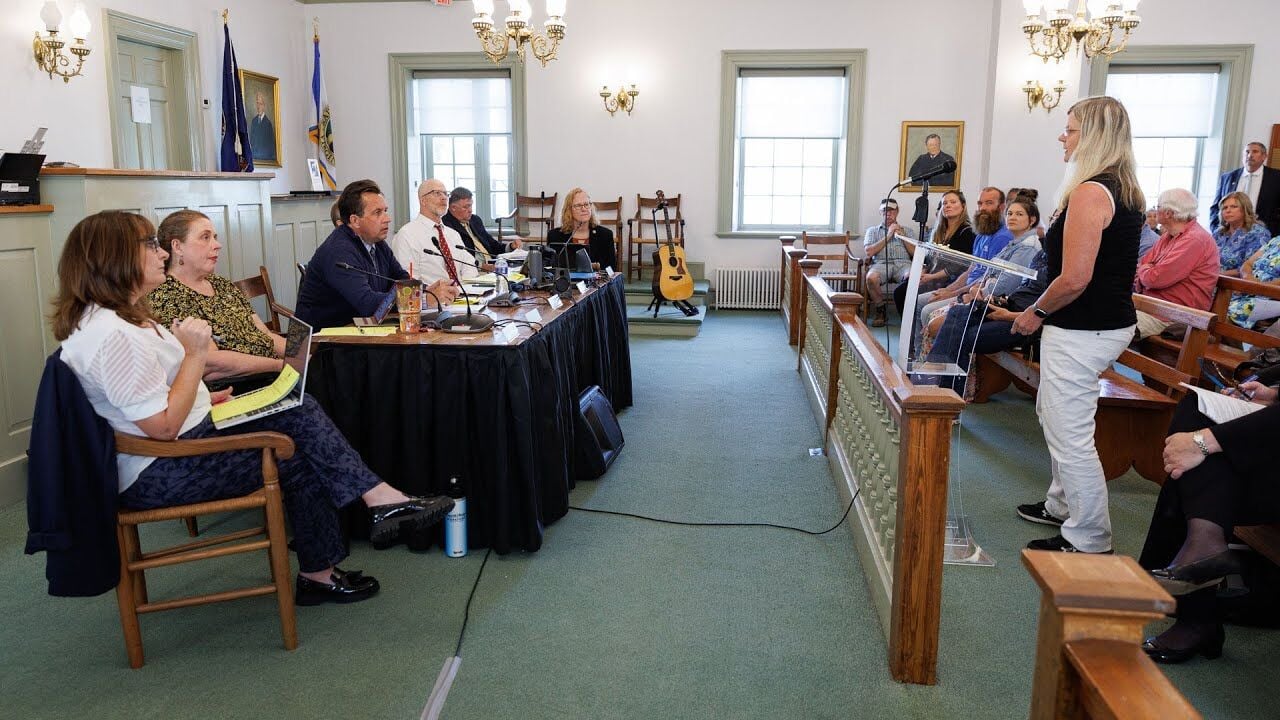No more ‘kicking the can down the road’
The Rappahannock County Board of Supervisors voted 4-1 last Wednesday to back a $1.4 million loan the Rappahannock County Water and Sewer Authority (RCWSA) intends to use to replace outdated equipment at the Sperryville wastewater treatment plant.
Cheri Woodard, RCWSA chair, asked the board to approve a support agreement which would allow RCWSA to purchase a local bond from the Virginia Resource Authority (VRA) to pay for necessary work and updated equipment at the facility.
Woodard described the disrepair the wastewater treatment system has fallen into, and said the bond would allow RCWSA to perform “very necessary work” at the plant and prevent system failures and contamination in the Thornton River.
The main issue is that the equalization tank — which collects incoming raw sewage — is near failing, and needs replacing. The 23-year-old tank was described as “badly corroded” and “nearing the end of its useful life” in a June report by a Lynchburg engineering firm, Mangrum Consulting and Design.
The tank suffered a rupture in 2012 when hurricane Sandy passed over Rappahannock, and according to Hampton Supervisor Keir Whitson, who was a member of the RCWSA board at the time, the tank was welded back together rather than being fully replaced.
Assistant County Administrator Bonnie Jewell discovered the VRA funding, and said that the interest rate offered is very low at 3.25-3.75% for a 30-year term. If RCWSA “had millions,” Jewell said, they would not need backing for the loan, but they do not have money set aside for major upgrades. The county is not being asked to pay for the upgrades, just to “backstop” the agreement between RCWSA and VRA.
“There was never any provision made during all the years we’ve been operating to put money aside for the future replacement, so now we’re faced with that as our main problem, and ‘no’ is not a solution to the problem,” Woodard said. “Bonnie was notified about two weeks ago that unless we got a support agreement for the RCWSA for this, we would not be eligible for this bond program. Again, doesn’t mean you have to pay for it, it just means you understand the need, you support it. . . it is not like you are saying, ‘yes, we’re taking over on this note.’”
Whitson asked what kind of support the county may need to provide by backing the loan, and in what circumstances the county would be asked to cover loan payments.
Jewell said the county will not be responsible for paying back the bond unless RCWSA is unable to pay, at which point VRA would come to the board and tell them the situation, and the board could decide how to move forward. If the BOS refused to pay, VRA could ask the state to withhold state funding from RCWSA
Diane Bruce, a Sperryville resident, said that her tax dollars go “toward everything” in the county, not just Sperryville, and that it is fair for the county and village to share responsibility for the plant’s upkeep.
“We can’t live there unless we have the plant,” Bruce said. “If Sperryville has to shut down because nobody will help us pay for it, what’s going to happen to the businesses in town?”
Several Sperryville residents spoke in favor of the sewer equipment updates, citing the need for a functional water and sewer system to prevent sewage from contaminating the Thornton River, and that if the “can is kicked down the road” further, the issues will only worsen.
Whitson said, “as one of the can kickers,” he agrees that the project should not be delayed any further.
To cover the loan repayment, which will add up to about $85,000 per year for a 30-year period, RCWSA plans to implement a stair-stepped rate increase for sewer service for Sperryville residents and businesses, raising to a projected $98.52 per month by 2029. The current rate is around $60 per month.
Will Lloyd, RCWSA board member, said that the bond amount would only cover replacement of the equalization tank and related processing equipment, and RCWSA will need to pursue future funding to replace and repair the collection system, which consists of key equipment like septic tanks, pump stations and force mains. Woodard and Lloyd said the new equalization tank will help accommodate some increased intake, but the collection system will need to be replaced down the line.
“The larger [equalization] tank does allow us to better accommodate that large flow, but we still have to fix that collection system,” Lloyd said. “The goal is not to expand capacity right now. It’s to fix the tank.”
Piedmont Supervisor Christine Smith spoke against backing the loan, and said that asking Sperryville residents to pay twice what they are paying now for sewer and water services may be detrimental to low-income households. She suggested pursuing grant funds to cover replacement costs, and asked if the decision could be delayed until the spring, when the next VRA loan cycle begins.
Jewell said the application could be delayed to the next funding cycle, but that would disrupt the anticipated project timeline.
“Does the plant need work? Yeah, it sure does. Can we scope the work to reduce the cost, maybe. Can we find other financing to offset the cost, maybe. But we’ve already jumped to the conclusion by the time this came to the board that it’s going to cost us $1.4 million and you have to do this now,” Smith said.
Smith voted against backing the bond, and all other members of the board voted in favor.
“We’ve chased all the grants, there are none,” Lloyd said. “This project is not going to go away. . . It’s only going to get more expensive if we start having failures at the plant. There’s a very high likelihood you can kiss that $1.4 million goodbye. So, we’ve kicked the can, and stepped on the can, we’ve run over the can, the can has holes in it. We need to fix the can.”
Woodard said they are hoping for a “hero like Chuck Akre” to provide some of the funding for the other equipment replacements, and they will continue to look for funds for future projects. Lloyd added that the RCWSA budget going forward and equivalency dwelling unit (EDU) rates — a unit of measure used to calculate sewer and water rates — will cover ongoing repair and upkeep costs, but not an entire overhaul of the system.
Ireland Hayes is a reporter for Foothills Forum, a nonprofit organization that supports local news in Rappahannock County.

Rappahannock County Board of Supervisors Regular Meeting, 7 p.m., Sept 2024

Rappahannock County Board of Supervisors Regular Meeting, 2 p.m., Sept. 4, 2024
Sign up for Rapp News Daily, a free newsletter delivered to your email inbox every morning.
Subtext 2024





